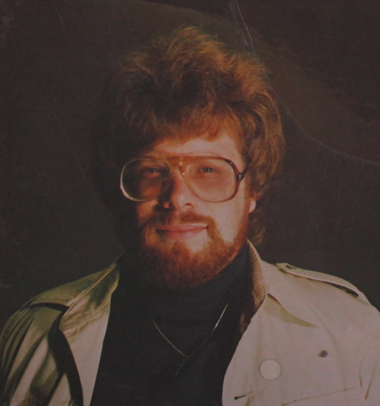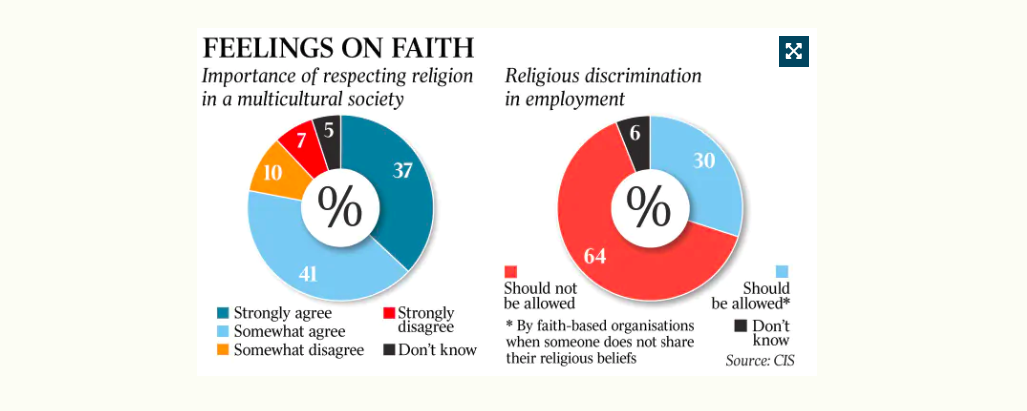December 3, 2019
Actually I AM religious, (Because I love the Lord)
And there’s no doubt about it
I really, really wanna shout it now
Singing, I’m not religious anymore, whoa yea
And there’s no doubt about it
I really, really wanna shout it now
Singin, I’m not religious
I just love the Lord
So sang Scott Wesley Brown back in 1977, in his song, I’m Not Religious, I Just Love the Lord, highlighting, if not indeed, confirming the divide between public and private faith.

Scott Wesley Brown channelling his inner Bob Ross
Wesley Brown’s song was an honest attempt to get to “the heart of the matter” and kill off nominalism and an outward piety that hid a pharisaical heart.
What it looks like in hindsight, given the hostile public square of the last fifteen years, is a pietistic withdrawal that confirms the view that religion is primarily a private matter, and should stick to its privatised knitting.
Which has, it must be said, a bad thing. A very bad thing. For just at the time that we need to have a dialogue about the place of religion in the public square (a good thing in my opinion), we’ve supped at the Kool Aid of privatised religion for forty or more years. It’s me and Jesus all the way down.
No doubt Wesley Brown does love the Lord, but I sure hope he is religious in the deeper, older sense of the word. The Romans used the term religio to describe the social obligations one had towards family, community, society and yes, even the gods.
A report just out by the Centre for Independent Studies, Respect and Division, How Australians View Religion, shows that, despite the many nay-sayers and the appalling scandals, people are favourably disposed towards religion. But there’s a catch. It’s more in the Scott Wesley Brown way of thinking about it – pietistic, privatised and individualistic.
The Australian newspaper reports that a YouGov Galaxy survey found:
Almost 80 per cent of Australians believe respecting religion is “important in a multicultural society”, with a new poll showing more than one in two backed faith-based perspectives being permitted in public debate “even when others find them offensive”.
Report authors, Monika Wilkie and Robert Forsyth, observe that Australians see their ability to tolerate even undesirable ideas as central to harmony.
But there’s a catch:
The results reveal Australians are viewing religion as mostly an individual right to belief but are sceptical of religious organisations.
Take a bow, Scott Wesley Brown.
None of this is particularly helpful in our current debate around religious freedoms. As far as I can tell the deepest greenest, most Wiccan pagan pansexual is more than happy for the average Bible believing evangelical to go on believing what they believe. Just as long as they keep it to themselves. As is the most ardent secular atheist. Religion is no threat when it’s not religio, and hence has no social obligation to family, community, society or the gods of the body politic.
Which is why the survey also found that Australians are not all that happy with religious discrimination in the workplace.

Some 64 per cent say it should not be allowed.
Now what does that mean? Does that mean discrimination in a specifically non-religious workplace that is not faith-based? Surely it does mean that if a Muslim woman works in your workplace you should respect her attire, and go out of your way to make her comfortable around people and foods. But what about religious schools? I dare say that same Muslim woman may want to send her children to a faith-based school where the sexual ethic is according to the teachings of the mosque, not the progressive state education sector.
The Australian goes on to say:
Ms Wilkie and Mr Forsyth said responses to the YouGov survey suggested there was “public misunderstanding about what religious freedom means”.
They said the debate on religious freedom would be improved by a “better understanding that religion is not simply a privately held belief, but includes the practices of one’s faith.
That’s the problem that we’re tackling right there. Privatised religion is fine. Just don’t think you can bring those beliefs anywhere else. This shows that Australians by and large have little stomach for any religious debate in the public square, and will likely, at the first sign of hostility at least, duck and cover.
The most telling comments by Wilkie and Forsyth are these:
“It is likely Australians are thinking of religious freedom as the ability for an individual to believe what they wish — a personal commitment that should be relegated to private thoughts.
“This interpretation of religious freedom leaves little room for the communal aspects of religion, or religious organisations, which are arguably more important than what an individual believes.”
And I just don’t think secular Australia gets that deep difference. That deep need to publicly affirm and shape its institutions publicly, according to religio. And religious Australia, not least of all in evangelical quarters these past couple of decades, has signed off on the Scott Wesley Brown version. His song’s a bit cheesy. Perhaps we can do Depeche Mode’s Personal Jesus as a rejoinder.
Australian evangelicalism is a long way from the US version, thankfully in many ways. But it’s also a long way off the robust public theology of the Roman Catholic church, which takes religio for granted.
I’m looking forward to reading Jonathan Cole’s new book over summer: Christian Political Theology in an Age of Discontent.
Here’s just one observation made of it:
Approaching politics as both art and science, this book lays a challenge at the feet of political theologians to offer a theological account of politics that is genuinely illuminating of political reality and efficacious for the faithful who seek to operate within it.
That’s a long way from Scott Wesley Brown’s song which, incidentally, goes on to warble:
Don’t go to church
Before you go to Jesus
Don’t go to church
Before you go to Jesus
To which nearly every Christian down the centuries would exclaim “Say what?” There’s no meaningful version of going to Jesus without religion, and definitely none without religio.
I’m currently reading Tom Holland’s Dominion: The Making of the Western Mind. He’s an atheist, but I reckon, on this front at least, he and Jonathan Cole have a lot more in common that Cole and Wesley Brown would have.
Written by
There is no guarantee that Jesus will return in our desired timeframe. Yet we have no reason to be anxious, because even if the timeframe is not guaranteed, the outcome is! We don’t have to waste energy being anxious; we can put it to better use.
Stephen McAlpine – futureproof
Stay in the know
Receive content updates, new blog articles and upcoming events all to your inbox.


